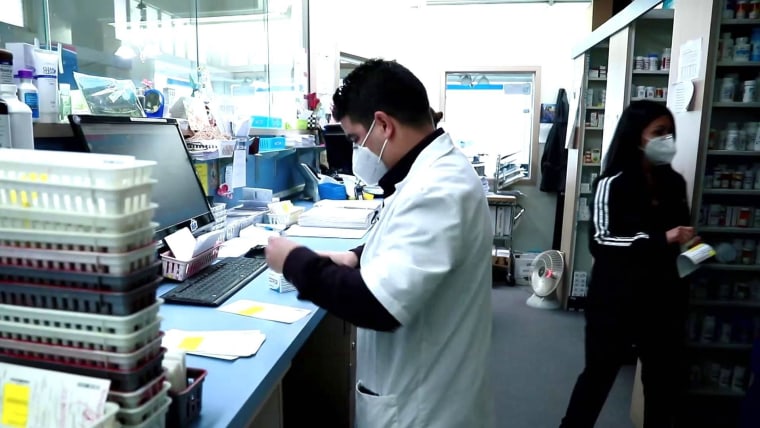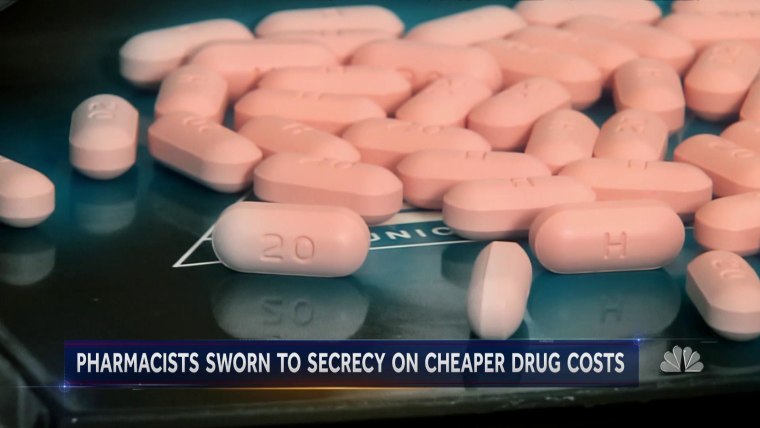Roughly half of pharmacists in the nation’s seventh most populous state say they do not have adequate time to complete their job safely, according to a report released by Ohio’s pharmacy regulator Tuesday. The state’s 4,000-person survey on pharmacist working conditions found the greatest concerns among pharmacists employed at large chain retail pharmacies.
The findings echo NBC News reporting in March that overworked, understaffed pharmacists at chain drug stores say they are reaching a breaking point.
Based on increasing complaints from pharmacists and growing concerns about working conditions among regulators and pharmacist organizations, the Ohio Board of Pharmacy conducted a survey of pharmacists working in a variety of job environments from July and August 2020 on the topic. Several other state regulators have issued such surveys, including Missouri and Vermont, which both conducted smaller surveys published in recent years.
In response to the survey results, the Ohio Board of Pharmacy voted unanimously Tuesday to create a committee to make recommendations on addressing issues raised by the survey.
“Pharmacist working conditions are vital to ensuring the safety of Ohio patients,” the Board said in a statement Tuesday. “The Board looks forward to working with stakeholders on its newly formed Pharmacist Workload Advisory Committee to discuss this important issue and develop recommendations to promote safer working conditions for pharmacists and pharmacy staff.”
The largest portion of surveyed pharmacists worked at large chain pharmacies — both standalone drugstores and grocery stores. The vast majority of pharmacists in both those work environments said they did not feel they had sufficient staffing for patient safety, and that they felt pressured to meet metrics that could interfere with patient care.
They also were least likely to have the opportunity for lunch and other breaks and most likely to work 10 hour or longer shifts. Ten percent of the respondents who worked at large chain drugstores said they work shifts longer than 13 hours.
When asked for additional comments at the end of the survey, multiple pharmacists noted that shift lengths were a major stressor. “12 hour shifts are brutal,” wrote one. Another said, “12 hours is too long for single pharmacist to work. It is unsafe after about hour 10: eye fatigue, brain fatigue, and not as fresh and alert as at beginning of shift.”
When asked to comment on the survey results, the National Association of Chain Drug Stores, the trade group representing all chain pharmacies in the country, referred to the statement it provided for the March report by NBC News. “Patient safety is a pharmacy’s top priority, and extensive care is taken to foster it,” the organization said, and it is advocating for state-level policies “essential for further optimizing care.”
The association added that “topics like workload and workflow are topics that are studied extensively,” and that a cause and effect relationship should not be assumed between prescription errors and current pharmacist responsibilities.
Surveyed pharmacists repeatedly linked the two in their comments, expressing concern about making errors due to workload. Pharmacy errors can range from smaller mistakes, like miscounting the number of pills in a bottle, to potentially deadly ones, like missing a dangerous drug interaction. Those that make it to regulators are taken seriously and, in some cases, can cost a pharmacist their license.
“The working conditions are very dangerous,” wrote one survey respondent who worked at a large standalone chain drugstore. “They are constantly cutting hours and expecting us to do more with less. I feel like there are at least 1‐2 dispensing errors every month in my pharmacy. If we were allowed to work at a safe pace, this would be completely avoidable.”
The most common reasons respondents gave for saying they felt they could not do their job safely were inadequate support staff for their workload; an emphasis on metrics, like the number of prescriptions filled per day; and too many non-clinical duties, such as making phone calls about refills.
“The report highlights how stressful the demands are at standalone pharmacies to meet metrics and increase profit,” said a pharmacist at a standalone Cleveland-area large chain drugstore, who asked to remain anonymous for fear of retribution. He called the comments in the survey “pretty spot on” with what he and colleagues around the country discuss in pharmacist Facebook groups with thousands of members.
The concerns of Ohio’s survey respondents match those expressed by 31 retail pharmacists and pharmacy technicians in 15 states who spoke to NBC News in 2020 and 2021. They shared stories of 10-hour or longer shifts so busy they didn’t have time to go to the bathroom or eat, crying in their cars every day after work from stress and lying awake at night worrying about mistakes they might have made while rushing.
“After 20 years of working at the same retail pharmacy and being asked to do more and more… with inadequate ancillary help; I recently decided to step away from pharmacy completely,” a surveyed pharmacist wrote. “My MAIN reason was because I did not feel safe — the environment was set up for me to fail and it was only a matter of time before I would make a horrific mistake.”
The Ohio Board of Pharmacy’s new advisory committee is scheduled to issue recommendations in late 2021.
Source: | This article originally belongs to Nbcnews.com













